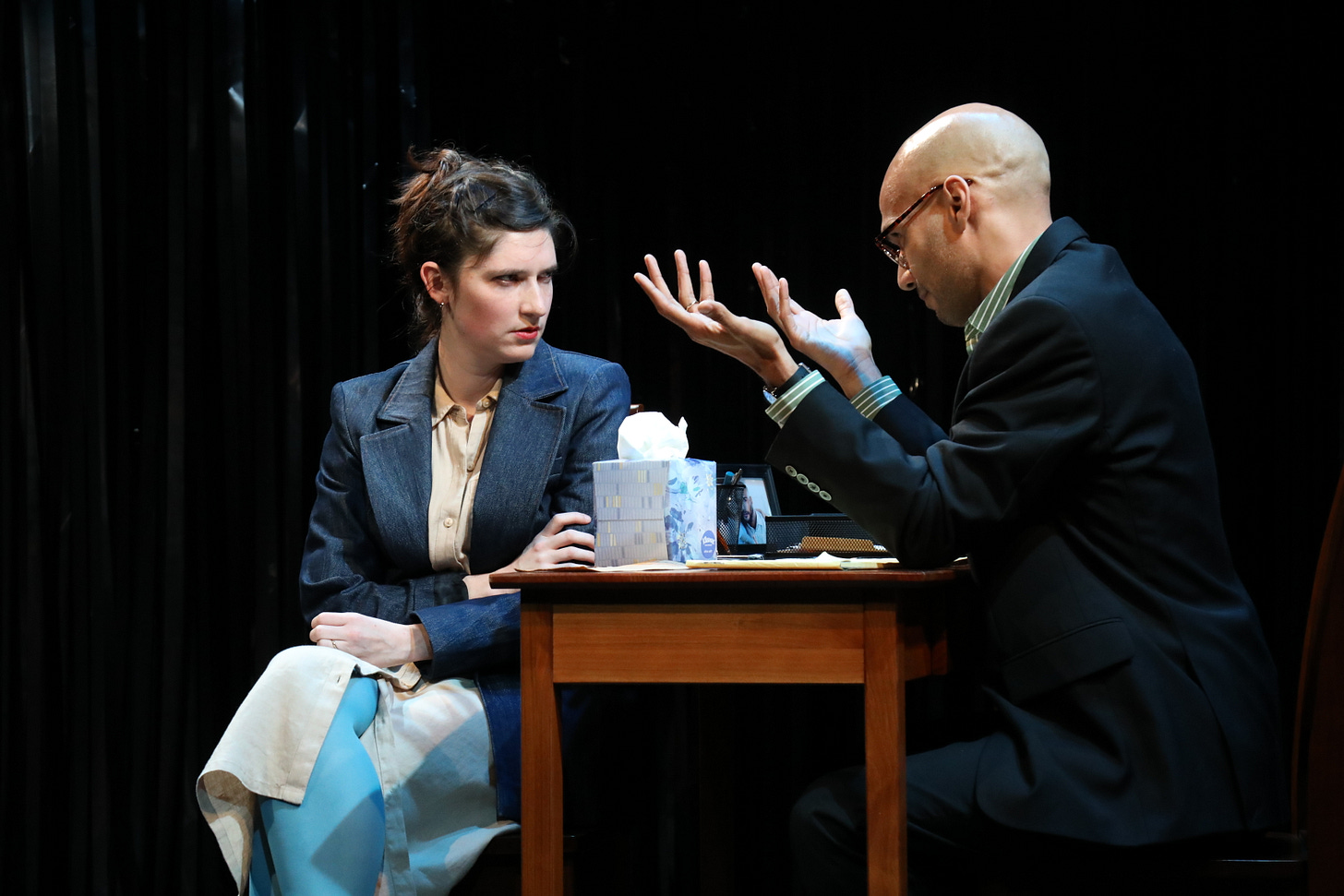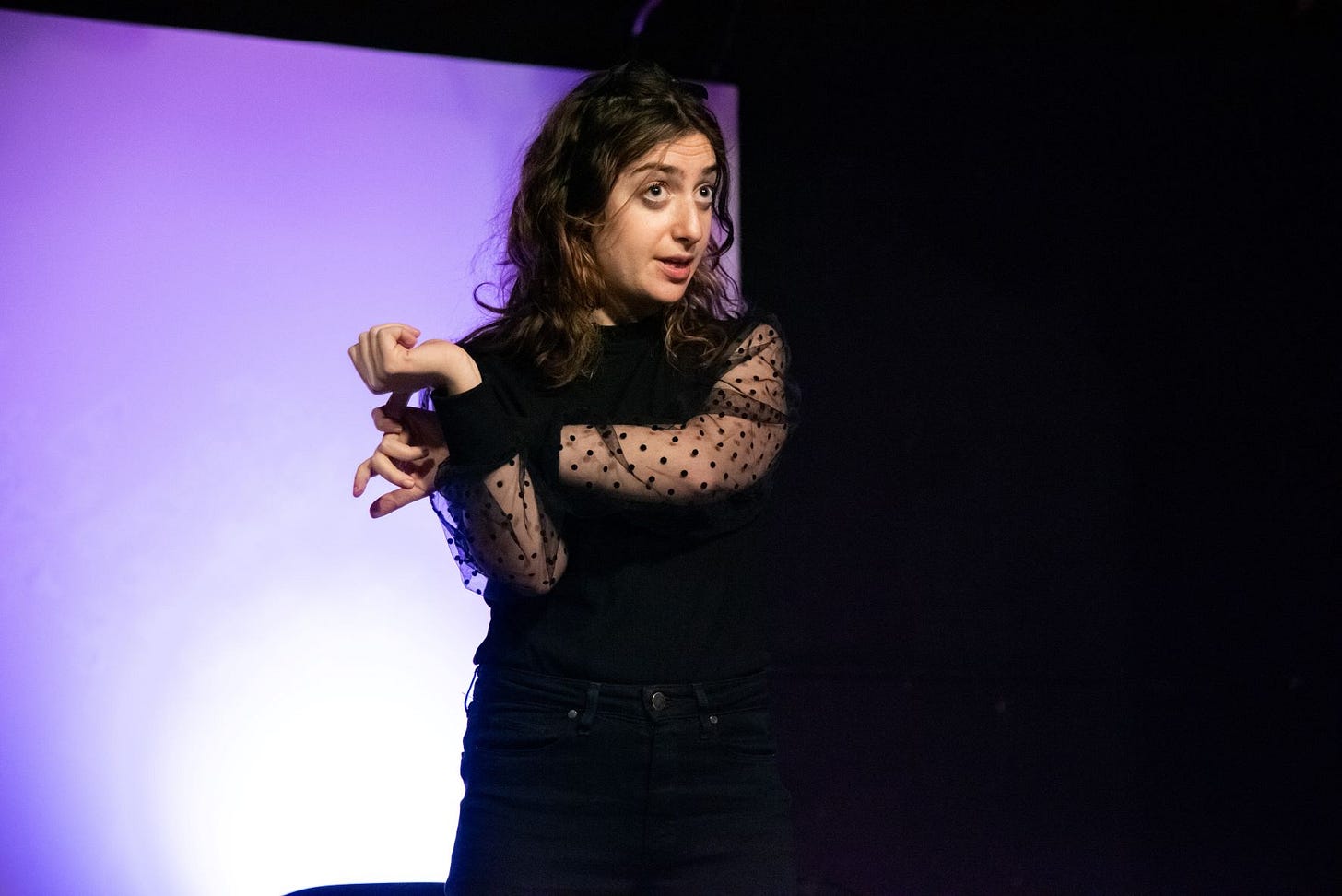Jewish Theater: First, the 7 Days of Creation, Then a Hookup With a Hot Israeli Cousin
Two female artists, Liba Vaynberg and Sophie Zucker, explore Jewishness in the present tense
Liba Vaynberg did not set out to dramatize the Book of Genesis.
The Gett was born of a joint commission from Rattlestick Theater and Congregation Beth Elohim (a reform synagogue in Park Slope, Brooklyn) created to bring more work that explores contemporary Jewish life to the stage. Vaynberg first proposed to examine the gett, a traditional divorce document in Jewish law.
Her resulting play, now running at Rattlestick through Dec. 11 (streaming tickets are also available) does interrogate the gett—and much more besides. Following textual research alongside Rabbi Matt Green, Vaynberg loosely structured the seven scenes of her darkly comic work around the opening verses of the Torah, or first five books of the Old Testament. In seven “days,” a woman is created. Each stage of her journey, from love, to divorce, to (finally) rest, mirrors each of the days of creation.
I spoke to Vaynberg about her Talmudic research, 15-minute divorces in the Garment District, and exploring present-day Jewish life onstage.
What was the initial inspiration behind The Gett?
What I was most curious about, with the commission, was how to write a play not centered around Israel and the Holocaust. Those are really important topics in American Jewry, but they are well-mined and well-explored by masters greater than me—and it’s really important to explore what it means to be Jews in the present tense. What it means to be Jews as romantic beings, and sexual beings, and cultural beings in America today. As a woman and artist, I particularly wanted to look at Jewish themes through a female lens,
[The form of the play] came out of a Talmudic text study with Rabbi Matt Green, and one of the big texts we discussed was Bereshit—Genesis. And the play takes its structure from that. Because that is, in a way, the way the first woman was created.
Right, you have described The Gett as “an English expansion, translation, and adaptation of the opening verses of the Torah or Old Testament.” Can you explicate that a bit further?
The first thing I will say is: If you know, you know, and if you don’t know, that’s okay too. The play works if you’ve never stepped foot in a synagogue or a church. You’ll have some sense that there’s a structure around something biblical, but you can follow it strictly as a story of love and loss.
That said, it was important to me to write something that was in conversation with people who are super Jewish, who did go to Hebrew school, who remember this shit even though they didn’t think they did. I didn’t realize how well I remembered the seven days of creation. These things are very standard fare in any Hebrew school or Sunday school.
And in particular, I thought it was really interesting that “Woman” is the last thing that’s created before the day of rest. So it felt like a natural structure actually for the play, because “Woman” is created before we finally have a moment to breathe and begin again.
In the sixth scene your character, Ida, finally separates herself from a man through a gett. You interviewed members of Beth Elohim’s congregation who had gone through the process of a gett themselves.
Their experiences, especially that of [former Rattlestick board member] Rosalee Lovett, to whom the production is dedicated, are sown through the whole play. One of the primary things all of these women mentioned was how unremarkable this experience of getting a gett was. The woman was irrelevant. It was a weird errand down on 36th Street in the Garment District, and they felt completely sidelined.
I wanted to talk about that, but I didn’t want the whole play to just be about sidelining women. So that feeds into the structure where we do see the gett, on the sixth day, the separation, we see the woman finally separating herself from the man—but we also get to see days one through five, of trying to have sex, and love again, and struggling through. ‘Cause otherwise it would just be fifteen minutes in the Garment District.
There’s not a ton of work on New York stages using those themes and ideas in telling a contemporary Jewish story. This season in particular has been heavy with works tied to the Holocaust or to Nazism.
Which also means I am going to be encountering people’s expectations of what a Jewish play is supposed to be. Which is usually, again, to do with the Holocaust. And that is important. I am the daughter of Holocaust survivors, and have many family members who didn’t survive.
But it does mean that it takes us a moment to settle into: in this play there will be sex, and there will be celebration, and there will be struggle, and we’re gonna wrestle with that. I feel like those more historical works must be companion pieces to [contemporary] works. For my grandmother, who recently died and was a Holocaust survivor, it was very important to her that we be Jewish. Yes, she had her story. But she also wanted to know what we were doing to be Jewish today.
Part Inside and part Fleabag, and with a little bit of Company, actress and comedian Sophie Zucker’s solo musical Sophie Sucks Face is at Soho Playhouse through Nov. 18. Loosely based on Zucker’s experience attending both grandparents’ funerals in quick succession, it sees “Sophie” hooking up with her second cousin from Israel at funeral one, then dealing with the consequences at funeral two.
Sophie Sucks Face explores love, incest and American-Israeli relations—except, that last one not really at all. Zucker discussed accidentally creating a very Jewish solo show.
How did Sophie Sucks Face come to be?
I experienced this thing where both my grandparents died shortly after one another. Which happens a lot, and to a lot of older people. It was just very bizarre doing the two funerals so close together. And so I thought about: What insane thing could happen at the first funeral that would have consequences you’d then have to deal with at the second?
Which is “Sophie” hooking up with her second cousin, who is in the Israel Defense Forces. Your show isn’t really political, so did that idea appeal mostly just because it was the most extreme possible thing?
Definitely I did not want to get political with this particular show. I was trying to write a love story. I realized how funny it could be that she’s attracted to this Israeli cousin for all the wrong reasons. She’s intrigued by the fact that he kills people for a living, and that he seems to have PTSD from it.
He’s not based on any real person, “Hot Israeli cousin” just made sense in the world of this show. But then I realized I actually do have an Israeli cousin, and I was like, oh, my God, I hope Itamar never sees this.
But right, it’s not really about him. He explains later in the show that his job is mostly checking passports. It’s more the ridiculous image she has of him.
Right, it’s her fantasy of it.
And she’s freaking out about her own relationship with her boyfriend, which is becoming serious.
In seeing her grandparents die so close together, Sophie is confronted with that intense, long-term love while she is in one of her first serious, healthy relationships ever. So she is working through the idea that she might have a long-term love like that, and it scares her.
How does Jewishness inform her story and the show as a whole? Particularly given all that those grandparents would have lived through together.
Immigrant divorces were definitely really uncommon, because they were all each other had when they moved to this country. My grandparents immigrated young, and they escaped before and after the Holocaust.
It’s more that culturally, my character is a budding movie star, and she’s weighing her options of living a rock-star life or settling down and getting married like most people in her Jewish community do. Also everyone at the funeral is so excited to hear that she has a boyfriend, and that he’s tall, and he’s Jewish. I do also have a boyfriend who is tall and Jewish, but I don’t like to talk about him in interviews ‘cause then he thinks he’s my muse.
It’s more Judaism as it translates through the cultural customs in her modern-day life, as opposed to trauma from the past.
That historical trauma only comes up through humor—you literally kick off with a joke about Scarlett Johansson not getting thrown in the oven after she changed her name.
Which is something my grandmother used to say a version of to me. She would say: “You need to marry Jewish because otherwise, when they come for you, he will leave you.”
It’s funny, I did not set out to write a Jewish show. But I can’t sit down and write anyone’s story at this point, I basically write versions of my story. So the Jewish context for it and the humor just came out. And now it’s a Jewish show.









